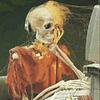Take a photo of a barcode or cover
This book was the follow up to Freakonomics, which I really enjoyed. This book discusses the hidden connections economically and psychologically between many things in our society. It talks about terrorists and how to detect them, about how prostitutes are important as real estate agents, etc, etc.
Although i really enjoyed Freakonomics, I personally thought this book was a disappointment. it was just like a little add on to the other book. It was one of those books where, if you read the table of contents, you basically know the book. I hate those books, i prefer a book with a lot of details, or at least one that expands a little bit more. The book was just a disappointment.
The authors wrote this book, basically because they felt they weren't done after the first. They felt they needed to expand, which they did, but it was in a rather low quality manner. In all honestly, i wouldn't recommend this book to a friend.
Although i really enjoyed Freakonomics, I personally thought this book was a disappointment. it was just like a little add on to the other book. It was one of those books where, if you read the table of contents, you basically know the book. I hate those books, i prefer a book with a lot of details, or at least one that expands a little bit more. The book was just a disappointment.
The authors wrote this book, basically because they felt they weren't done after the first. They felt they needed to expand, which they did, but it was in a rather low quality manner. In all honestly, i wouldn't recommend this book to a friend.
Rating: 3.5
Book warnings: One chapter about the economics of prostitution? (also felt oddly pro it)
Very readable and I enjoyed it but not as much as the first. Maybe it was because I had been surprised by the first whereas I knew roughly what to expect here but also some of the topics just weren't that great. I also wasn't sure what to believe in the climate change chapter. A fun enough one time read.
Book warnings: One chapter about the economics of prostitution? (also felt oddly pro it)
Very readable and I enjoyed it but not as much as the first. Maybe it was because I had been surprised by the first whereas I knew roughly what to expect here but also some of the topics just weren't that great. I also wasn't sure what to believe in the climate change chapter. A fun enough one time read.
This book came out in 2009 and I don't know how it wasn't recommended to me for all these years since. Human "outlier" behavior that's seen through a microeconomics lens with a nice whopping of microhistory throughout. Right up my alley!
Obviously, some of its data is outdated now due to the pandemic, etc., but that's going to happen for any timely econ book. Loved it!
Obviously, some of its data is outdated now due to the pandemic, etc., but that's going to happen for any timely econ book. Loved it!
Looking through the reviews it seems like people had very polarizing opinions and often got emotionally stuck in certain specific points that they disagreed with the author on. Personally I can't say that I agreed with every word on every page but I found the perspective interesting. I want different perspectives, reading a behavioral scientists views stretches my somewhat informed but non expert opinion.
“Most of us want to fix or change the world in some fashion. But to change the world, you first have to understand it.” The only thing I would add is that you have to understand the expertise and opinions of people around those changes you want to see made to the world.
“Most of us want to fix or change the world in some fashion. But to change the world, you first have to understand it.” The only thing I would add is that you have to understand the expertise and opinions of people around those changes you want to see made to the world.
Although this book is compelling, it doesn't have the same zest as "Freakonomics." I found sections of this book difficult to get through. I was disappointed.
I love the Freakonomics series. So logical, entertaining, and oftentimes loaded with hard truths. Learning about incentives is cool!
Another outstanding entry from Levitt and Dubner! I highly recommend this book to everyone who has ever pondered strange questions - it's a very entertaining read!
Quick read. Same as the last book, different anecdotes. Cool.
informative
reflective
slow-paced





